Federal Employees Lose Early Bid to Stop Unpaid Work During Trump's Shutdown
US District Judge Richard Leon in Washington said a temporary restraining order would have caused "chaos and confusion."
January 15, 2019 at 01:30 PM
6 minute read
 Judge Richard Leon of the U.S. District Court for the District of Columbia. Photo: Diego M. Radzinschi/NLJ
Judge Richard Leon of the U.S. District Court for the District of Columbia. Photo: Diego M. Radzinschi/NLJ
Updated at 3:10 p.m.
Hundreds of thousands of federal employees will be required to continue to work without pay during the government shutdown, a Washington federal judge ruled Tuesday, denying an emergency request that said the Trump administration was violating federal law by forcing employees into “involuntary servitude.”
U.S. District Judge Richard Leon, overseeing three lawsuits at a hearing in Washington, refused to issue a temporary restraining order, saying such a move potentially would have brought “chaos and confusion” and put lives at risk by shuttering government functions the executive branch has deemed essential.
Leon expressed some reluctance to enter into the political fray that has left the government unfunded since Dec. 22. More than 400,000 federal employees across agencies are still working, despite not being paid during the shutdown, now the longest in the nation's history.
“It's hard not to empathize with the plaintiffs. They are not at fault,” Leon said. He continued, “Yet, the judiciary is not another source of leverage to be tangled in this struggle.”
Two unions—the National Treasury Employees Union and the Air Traffic Controllers Association—and a group of five individual federal employees sued in Washington's federal trial court alleging that forced-work without pay is violating federal law. Attorneys for the employees presented arguments that say these employees forced to work face unpaid medical bills, cannot afford child care and have no funds for essential needs as long as the government forces them to work without paychecks.
Yet, Leon concluded that said it was not the role of the court to wade into the political stalemate. He said such emergency measures were reserved for irreparable injury in “extraordinary or drastic” cases. He said issuing a temporary restraining order “would be profoundly irresponsible.”
“It would at best be chaos and confusion, at worst it would be catastrophic consequences,” Leon said.
Lawyers for the challengers asked Leon to stop the government from requiring employees report without pay, allow the employees to not show up for work without employment consequence and permit the employees to look for other work during the lapse in government appropriations.
These “excepted” employees, who are required to work during government shutdowns without pay, argued the government is violating the Fair Labor Standards Act and also provisions of the U.S. Constitution that require due process.
Central to the dispute is the Antideficiency Act, the 1870 law that sets the parameters of what happens when agencies run out of federal funding. Generally, federal officials are prohibited from working during a shutdown save for instances that involve the safety of human life or the protection of property.
The suits tee up a constitutional challenge to the life-and-property exception, saying that it conflicts with the Constitution's appropriations clause, which gives Congress the sole power to appropriate funds.
Daniel Schwei, arguing for the Justice Department, said the public interest in not granting the restraining order outweighed the harm felt by federal employees. “It would be an untenable result with a significant impact on public interest,” Schwei said.
Prisons, law enforcement agencies and other essential functions of the federal government would be halted, Schwei said. Air traffic controllers who stayed at home, unpaid, would mean limit airline traffic.
Paras Shah, assistant counsel for the National Treasury Employees Union, urged Leon in court to grant a temporary restraining order for 72 hours to put pressure on Congress to open the government and pay the employees. He acknowledged such a move would alter the status quo.
“Should they do their duty, chaos could be avoided,” Shah told the judge.
Leon told Shah that the court must take into consideration the public harm that granting a request that would eliminate essential workers as an exception to government shutdowns. He said that it's not the role of judiciary to appropriate funds. He also stressed several times that President Donald Trump and Congress have said the employees who are working, and the furloughed employees will be made whole.
He also said the executive branch should make decisions about which federal employees are deemed “essential,” not the courts.
Michael Kator of Washington's Kator, Parks, Weiser & Harris, who represented individual plaintiffs at Tuesday's hearing, asked the court to give employees the option to work or stay home to find alternate work until the shutdown is lifted.
 Michael J. Kator. Photo by Diego M. Radzinschi / NLJ
Michael J. Kator. Photo by Diego M. Radzinschi / NLJKator said the government forced these workers into “involuntary servitude” in violation of the Constitution.
The Justice Department later disputed that workers were not able to work outside of the daily jobs, and could not cite a regulation that did not allow federal workers to take extra work, such as driving for Uber or Lyft.
Molly Elkin, who advocated for the National Air Traffic Controllers Association, said controllers play an essential role and are already understaffed. She cited instances when Leon granted housing assistance pay and veteran pay to citizens in other instances in emergency situations. Leon said those circumstances were different.
“A (temporary restraining order) would have incredible impact on the nation,” Leon said. “A chaotic impact.”
Leon set a hearing for a preliminary injunction for Jan. 31.
Read more:
Law Firms Face 'Uncharted Waters' as Shutdown Grinds Some Practices to a Halt
DC Circuit Judges Feud, and New Suits Pile Up, as Shutdown Persists
Read the Complaint: Air Traffic Controllers Union Sues Trump
This content has been archived. It is available through our partners, LexisNexis® and Bloomberg Law.
To view this content, please continue to their sites.
Not a Lexis Subscriber?
Subscribe Now
Not a Bloomberg Law Subscriber?
Subscribe Now
NOT FOR REPRINT
© 2025 ALM Global, LLC, All Rights Reserved. Request academic re-use from www.copyright.com. All other uses, submit a request to [email protected]. For more information visit Asset & Logo Licensing.
You Might Like
View All
'Lack of Independence' or 'Tethered to the Law'? Witnesses Speak on Bondi
4 minute read


DOT Nominee Duffy Pledges Safety, Faster Infrastructure Spending in Confirmation Hearing
Trending Stories
- 1Bribery Case Against Former Lt. Gov. Brian Benjamin Is Dropped
- 2‘Extremely Disturbing’: AI Firms Face Class Action by ‘Taskers’ Exposed to Traumatic Content
- 3State Appeals Court Revives BraunHagey Lawsuit Alleging $4.2M Unlawful Wire to China
- 4Invoking Trump, AG Bonta Reminds Lawyers of Duties to Noncitizens in Plea Dealing
- 522-Count Indictment Is Just the Start of SCOTUSBlog Atty's Legal Problems, Experts Say
Who Got The Work
J. Brugh Lower of Gibbons has entered an appearance for industrial equipment supplier Devco Corporation in a pending trademark infringement lawsuit. The suit, accusing the defendant of selling knock-off Graco products, was filed Dec. 18 in New Jersey District Court by Rivkin Radler on behalf of Graco Inc. and Graco Minnesota. The case, assigned to U.S. District Judge Zahid N. Quraishi, is 3:24-cv-11294, Graco Inc. et al v. Devco Corporation.
Who Got The Work
Rebecca Maller-Stein and Kent A. Yalowitz of Arnold & Porter Kaye Scholer have entered their appearances for Hanaco Venture Capital and its executives, Lior Prosor and David Frankel, in a pending securities lawsuit. The action, filed on Dec. 24 in New York Southern District Court by Zell, Aron & Co. on behalf of Goldeneye Advisors, accuses the defendants of negligently and fraudulently managing the plaintiff's $1 million investment. The case, assigned to U.S. District Judge Vernon S. Broderick, is 1:24-cv-09918, Goldeneye Advisors, LLC v. Hanaco Venture Capital, Ltd. et al.
Who Got The Work
Attorneys from A&O Shearman has stepped in as defense counsel for Toronto-Dominion Bank and other defendants in a pending securities class action. The suit, filed Dec. 11 in New York Southern District Court by Bleichmar Fonti & Auld, accuses the defendants of concealing the bank's 'pervasive' deficiencies in regards to its compliance with the Bank Secrecy Act and the quality of its anti-money laundering controls. The case, assigned to U.S. District Judge Arun Subramanian, is 1:24-cv-09445, Gonzalez v. The Toronto-Dominion Bank et al.
Who Got The Work
Crown Castle International, a Pennsylvania company providing shared communications infrastructure, has turned to Luke D. Wolf of Gordon Rees Scully Mansukhani to fend off a pending breach-of-contract lawsuit. The court action, filed Nov. 25 in Michigan Eastern District Court by Hooper Hathaway PC on behalf of The Town Residences LLC, accuses Crown Castle of failing to transfer approximately $30,000 in utility payments from T-Mobile in breach of a roof-top lease and assignment agreement. The case, assigned to U.S. District Judge Susan K. Declercq, is 2:24-cv-13131, The Town Residences LLC v. T-Mobile US, Inc. et al.
Who Got The Work
Wilfred P. Coronato and Daniel M. Schwartz of McCarter & English have stepped in as defense counsel to Electrolux Home Products Inc. in a pending product liability lawsuit. The court action, filed Nov. 26 in New York Eastern District Court by Poulos Lopiccolo PC and Nagel Rice LLP on behalf of David Stern, alleges that the defendant's refrigerators’ drawers and shelving repeatedly break and fall apart within months after purchase. The case, assigned to U.S. District Judge Joan M. Azrack, is 2:24-cv-08204, Stern v. Electrolux Home Products, Inc.
Featured Firms
Law Offices of Gary Martin Hays & Associates, P.C.
(470) 294-1674
Law Offices of Mark E. Salomone
(857) 444-6468
Smith & Hassler
(713) 739-1250










